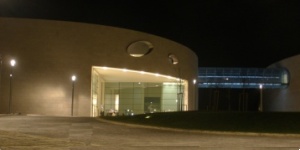
Image Source: Fundação Champalimaud
When in May 8, 2004 António Champalimauds’ life came to an end, few people knew that this Portuguese industrialist and entrepreneur stipulated in his will an endowment of 500 million euros to create a foundation for the advancement of medical science for Portugal and for the World.
This organization, Champalimaud Foundation, has as an objective, to benefit people and to support and to stimulate new discoveries in the field of Neurosciences, Cancer Research and the prevention & treatment of vision related diseases.
The Foundation is composed of a Board of Directors, a General Council and a Scientific Committee.
The Board of Directors is chaired by Leonor Beleza and joined by João Botelho and António Horta-Osório.
The General Council’s purpose is to determine the course of the foundation’s ongoing direction. Their 12 members (including President Cavaco Silva, the former President of Brazil, Fernando Henrique Cardoso, the Professor of Neuroscience at the University of Southern California, António Damásio and the member of the Académie Française and Politician, Simon Veil, among other prominent figures held in great esteem in their field) come from diverse cultural and professional backgrounds.
The Scientific Committee is comprised of renowned scientists, researchers, academics and medical practitioners. The Committee is chaired by James Watson, Nobel Laureate and co-discoverer of the structure of the DNA molecule (Watson and Crick structure of the DNA molecule, discovered in 1953).
In order to house the Champalimaud Foundation’s initiatives of enhancing the well-being of people around the world, the Champalimaud Centre for the Unknown was created and inaugurated on October 5th 2010, during the Centenary of the Portuguese Republic.

Image Source: BestInPortugal.com
The Centre, designed by Charles Correa, a chartered architect of Indian origin and member of the Royal Institute of British Architects-RIBA, is composed of 3 buildings:
- Building A – diagnosis, treatment & research
- Building B – Auditorium, exhibition area, restaurant and offices
- Building C – open air amphitheatre
This Gold Medal awarded RIBA member designed a Centre to provide a cutting-edge medical facility for scientific research that marks a watershed in the scientific development of the country. In fact, the Centre for the Unknown is located near the historic site in Belém, from which the great navigators departed in the 15th and 16th centuries on their voyages to the unknown.
The activities of the Champalimaud Centre are divided into two main branches, the Neuroscience Program and the Translational Cancer Research.
The Champalimaud Neuroscience Program’s objective is to unravel the neural basis of behavior. To achieve this, it hosts a number of research groups that are looking to make important breakthroughs in the understanding of the neural basis of behavior. By investing in basic research in this field, these research groups believe that they will significantly impact on the understanding of brain function, which will in turn contribute to the understanding and possible treatment of brain dysfunction.
The Translational Cancer Research was developed taking into account that Cancer is responsible for 25% of all EU deaths ( 40% of deaths in the 55-74 age group). Translational Research aims to create a link between Hospitals and Research Centers by removing the barriers between clinical and basic research. The Champalimaud Cancer Research Program is directed towards widening the gap between incidence and mortality by confronting the growing burden of cancer.

Image Source: Fundação Champalimaud
Other projects carried by the Champalimaud Foundation are the António Champalimaud vision award and the Champalimaud Translational Centre for Translational Eye Research (known as C-TRACER).
The António Champalimaud vision award was launched in 2006 in Brussels with the support of the President of the European Commission, José Manuel Barroso, with the plight that it would encourage vision research and support the fight against blindness. With a one million euros annual prize, the largest monetary prize in the field of vision and one of the largest scientific prizes in the world, it has a dual focus of recognizing the fight against blindness, particularly in developing countries (during odd years), and outstanding scientific research produced (during even years). This award distinguishes groups and teams rather than individuals, besides fostering collaboration.
The award recipients were:
- 2007 – Aravind Eye Care System (Madurai, India), as the largest and most productive eye care facility in the world
- 2008 – Drs. Jeremy Nathans & King-Wai Yau, recognized for discoveries of the fundamental understanding of the mechanisms of vision
- 2009 – Hellen Keller International, for the outstanding contributions to healthcare in preventing blindness and reducing malnutrition in the developing world and the groundbreaking vitamin A supplementation program.
- 2010 – Drs. J. Anthony Movshon & William T. Newsome, awarded in recognition of their ground-breaking work over the last 30 years on scientists’ understanding of how the brain reconstructs images, so that human beings can perceive, interpret and act in the world.
The Champalimaud Translational Centre for Translational Eye Research (C-TRACER) is based in the city of Hyderabad, India, and it was created following a historic agreement between the Champalimaud Foundation and the LV Prasad Eye Institute, one of the world’s leading centres of translational research.
The C-TRACER Centre is making a significant contribution to the prevention and eradication of vision related disease and illness by stimulating research and therapy through the utilization of stem cells in vision related illnesses.
Capitalizing on the progress achieved by the C-TRACER program, a new facility designated C-TRACER II, was launched in Portugal in 2010 in a partnership established between Champalimaud Foundation and the Association for Biomedical Investigation into Light and Image (AIBILI). This Centre, led by Prof. José Cunha-Vaz, will carry out vision research in Portugal to be applied to the treatment of eye disorders.
Through innovation, creativity and collaboration, the Champalimaud Foundation through its Champalimaud Centre for the Unknown will bring the benefits of medical science to those most in need.
For more information see the site of Champalimaud Foundation, and visit their Facebook page

{ 2 trackbacks }